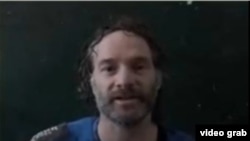The release of American freelance journalist Peter Theo Curtis reveals growing divisions between the different offshoots of the terrorist al-Qaida group fighting for power in Syria, analysts say.
Curtis was released Sunday by Jabhat al-Nusra, one of the number of Islamist groups fighting for control of Syria. Al-Nusra recently broke off relations with the Islamic State fighters, saying their methods were too brutal.
His release comes just days after al-Nusra's rivals, the extremist Islamic State group, videotaped its beheading of American journalist Jim Foley.
Jonathan Adelman, associate professor at the University of Denver's Korbel School of International Studies, says al-Nusra does not want to be associated with the Islamic State of Iraq and Syria, or ISIS.
"Al Nusra, which is more of a Syrian group, rather than a caliphate or international group, clearly wanted to demonstrate that, even though they've killed and tortured people before, that they are not like ISIS. They are trying to differentiate themselves."
The U.N. has accused the Islamic State group with "horrific" and widespread human rights violations, ranging from mass executions to slavery and rape. The group has seized a wide swathe of eastern Syria and northwestern Iraq.
Middle East analyst Stephen Zunes of the University of San Francisco says al-Nusra might be trying to forestall any U.S. attacks against them if the U.S. decides to chase Islamic State militants with airstrikes from Iraq back into Syria.
"There is some suspicion that the United States and perhaps other countries will take their battle against ISIS that we have already seen develop in Iraq across the Syrian border, and I think the al-Nusra folks are trying to make it clear they are a separate grouping and don't want to be on the receiving end of any U.S. military retaliation."
Curtis was handed over to U.N. peacekeepers in the Golan Heights, then delivered to U.S. representatives. Curtis's family has said the government of Qatar helped mediate his release.
Curtis's mother, Nancy, has said she was not aware of any money exchanged for the release of her son.
U.N. spokesman Stephane Dujarric said the United Nations was not involved in the negotiations for Curtis's release. Dujarric said the journalist received a quick medical checkup and seemed fairly healthy before he was released to U.S. authorities.
The U.S. reporter, who was kidnapped in Syria in October 2012, is expected to be reunited with his family soon.
Qatar is believed to be backing some of the groups that have been fighting to topple Syrian leader Bashar al-Assad, an aim Washington has supported, but also backs Hamas, a group the U.S. has designated a terrorist organization.
Washington has supported more moderate rebel groups seeking President Assad's overthrow, but if the U.S. were to take its air war against the Islamic Group into Syria, it could inadvertently aid Assad's survival.
On Sunday, Islamic Group fighters captured a major air base in northeast Syria.
Syria has offered to help international efforts to fight the Islamic State extremists.





